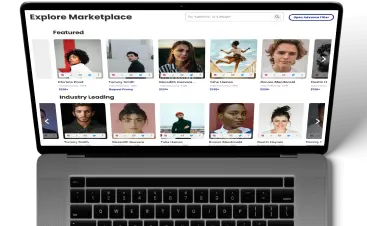Using Artificial Intelligence for Influencer Marketing
Influencer marketing has become an increasingly popular strategy for businesses looking to promote their products or services. This type of marketing involves partnering with individuals with a large social media following and leveraging their influence to reach a wider audience. In recent years, artificial intelligence (AI) has begun to play a role in influencer marketing, offering new business opportunities and challenges. With the rise of sites like ChatGPT, more and more influencer marketing campaigns will be streamlined through AI systems than ever before.
The Benefits of Using AI for Influencer Marketing
One of the main advantages of using AI in influencer marketing is the ability to quickly and accurately identify the most effective influencers for a campaign. Traditional methods of identifying influencers often rely on manual research and analysis, which can be time-consuming and error-prone. AI algorithms, on the other hand, can quickly analyze large amounts of data to identify the most influential individuals within a particular niche based on their number of followers, engagement rates, and relevance to the campaign’s target audience.
Another benefit of using AI in influencer marketing is the ability to automate many tedious and repetitive tasks in campaign management. For example, AI can automatically track influencer posts’ performance, providing detailed insights into their effectiveness and allowing businesses to optimize their campaigns in real time. AI can also automate the negotiation and payment process, streamlining it and freeing up time for companies to focus on other aspects of their marketing strategy.
How are virtual influencers changing the influencer marketing industry?
Virtual influencers are digital personas created using computer-generated imagery (CGI) and artificial intelligence (AI) technologies. These virtual characters are designed to resemble real humans and have distinct personalities, interests, and traits. These digital creations blur the line between reality and fantasy, challenging traditional notions of celebrity and fame. With technological advancements, virtual influencers continue to evolve, becoming increasingly lifelike and interactive. They represent a novel approach to influencer marketing, offering brands new opportunities for engagement and storytelling in the digital age.
Virtual influencers are shaking up the influencer marketing scene, bringing along a host of advantages. They offer brands unprecedented control, 24/7 availability, global appeal, innovative content possibilities, reduced risks compared to human influencers, and long-term cost-effectiveness, reshaping the influencer marketing landscape.
Nevertheless, there are drawbacks to consider. Companies might have less control over virtual influencers than presumed. Additionally, virtual influencers could be perceived as lacking authenticity or even unsettling. The human narrative may be absent, leading to shallower engagement. While virtual influencers generate high engagement due to their novelty, their long-term sustainability remains uncertain.
Territory Influence reports that the virtual influencer market is worth $4.6 billion and is expected to grow by 26% by 2025.
Integrating real-world and virtual influencers presents an intriguing opportunity for marketers, offering fresh creative possibilities. Nonetheless, this approach carries inherent risks and considerations concerning audience engagement. As the influencer landscape evolves, striking a delicate balance between innovation and audience receptivity remains paramount for achieving lasting success in marketing endeavors.
How Can You Avoid Common Issues and Challenges of Using AI in Influencer Marketing?
A simple yet effective strategy to avoid this can be merging AI capabilities with human ingenuity. While AI algorithms can assist in content generation and influencer selection, they may lack the nuanced understanding and emotional depth humans bring. By leveraging AI for data-driven insights and automation while infusing human creativity into strategy development and content creation, marketers can create compelling campaigns that resonate authentically with their audience.
This hybrid approach allows for the best of both worlds, harnessing the efficiency of AI technology while preserving the unique human touch essential for genuine engagement and connection. Additionally, using specialized influencer marketing tools can provide marketers with a comprehensive solution for campaign management, offering valuable insights and streamlining processes for optimal results.
The Drawbacks of Using AI for Influencer Marketing
However, there are also challenges and potential drawbacks to using AI in influencer marketing. One of the main concerns is the potential for AI algorithms to perpetuate existing biases and discrimination within the industry. For example, suppose an AI system is trained on data predominantly from male influencers. In that case, it may recommend these individuals over others, regardless of their influence or relevance to the campaign. This could lead to a lack of diversity in influencer campaigns, alienating target audience segments and damaging a brand’s reputation.
Another potential challenge is the increasing use of AI-generated fake influencers, known as “social bots.” These are automated accounts designed to mimic the behavior of real influence to to gain followers and engagement. They can be challenging to identify and can potentially damage the credibility of influencer marketing if they are used to promote products or services.
Does AI Have a Place in Influencer Marketing?
Despite these challenges, AI has the potential to significantly enhance influencer marketing if used responsibly and in conjunction with other marketing strategies. By leveraging the speed and accuracy of AI algorithms, businesses can more easily identify the most effective influencers and optimize their campaigns in real time. However, it is essential for businesses to be aware of AI’s potential drawbacks and biases and to address these issues to ensure the success and credibility of their influencer marketing efforts.
If your business wants to grow its influencer marketing presence, join Glewee and immediately access our network of creators today!





